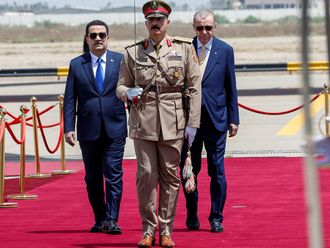Mosul: Rain and fog forced Iraqi government troops to halt their push against Daesh in Mosul’s Old City on Thursday but the terrorists holed up in its houses and narrow alleyways took advantage of the lull to hit back.
The army and security forces have made significant gains in recent days in the battle that started in October, seizing a main bridge over the Tigris river and advancing towards the mosque in the Old City from where Daesh’s leader declared a so-called caliphate in 2014.
Mosul has been the terrorists’ main urban stronghold in Iraq but they have steadily lost ground since the offensive began and Iraqi leaders say the battle is reaching its final stages.
Earlier on Thursday, government forces were attempting to encircle the Old City to bottle up Daesh terrorists.
Several more areas of western Mosul had been recaptured, including the hospital, over Wednesday and Thursday morning but officers said progress was slowed by car bombs and booby-traps in houses and alleyways.
“Operations in the Mosul west Old City have been halted on Thursday due to bad, rainy weather. We can’t advance without air strikes cover due to the fog,” a Rapid Response unit spokesman said.
Daesh hit back with sporadic attacks on government positions, including mortar fire, reporters at the scene said.
A Federal Police officer confirmed the halt and said commanders were meeting to adjust their plans.
“The new offensive plans should adapt with the difficult terrain of the complicated, narrow alleys,” he said. “The tight roads prevent us from using armoured vehicles and that will definitely leave our soldiers vulnerable to enemy fire. New plans under study will tackle this issue.” The need to ensure the safety of civilians, many of them hungry from a lack of provisions and traumatised by living under Daesh’s harsh rule, was also a priority.
As many as 6,000 Daesh terrorists remained in Mosul, Federal Police Major General Haidar Dhirgham said, talking inside the city at a police forces forward base as refugees trudged through the muddy streets and wrecked houses.
Daesh suicide bombers had driven explosive-rigged cars at troops, he said. There had been three such attacks on Thursday morning. Troops had also seized buildings in which suicide vehicles were being prepared.
“The enemy ... has started to set fire to houses which means they are on the retreat. They have destroyed homes and have destroyed families,” Dhirgham said, speaking before the halt was called.
Mosul has served as Daesh’s de facto capital since its leader Abu Bakr Al Baghdadi proclaimed himself head of a so-called caliphate spanning Iraq and Syria from the Nuri Mosque in July 2014. The black Daesh flag still flew from the mosque’s leaning minaret on Thursday.
The recapture of the city by the government would drive the remnants of the Daesh terrorists into the hinterlands. In neighbouring Syria, three separate forces are advancing on the city of Raqqa, the main Syrian city under Daesh control.
As well as fighting in Iraq and Syria, the terrorists have inspired attacks in cities in Europe, Africa and elsewhere that have killed hundreds of civilians.
US and other Western countries have been providing air, artillery and other support to the Mosul offensive, reflecting the international concern over the Daesh threat.
However, the presence of tens of thousands of civilians in Daesh-held areas means that simply pulverising them is a risky proposition. Thousands of residents have escaped to government lines in recent days but it has been impossible to tally the number of civilian casualties.
“We will liberate civilians before liberating the land,” Dhirgham said.
“I expect the liberation of Mosul completely in one month. I will not tell you one or two weeks, because that’s not true, but within one or two months it will be completely liberated.”











